Tyrosine supplementation for phenylketonuria
- PMID: 33427303
- PMCID: PMC8094217
- DOI: 10.1002/14651858.CD001507.pub4
Tyrosine supplementation for phenylketonuria
Abstract
Background: Phenylketonuria is an inherited disease for which the main treatment is the dietary restriction of the amino acid phenylalanine. The diet has to be initiated in the neonatal period to prevent or reduce mental handicap. However, the diet is very restrictive and unpalatable and can be difficult to follow. A deficiency of the amino acid tyrosine has been suggested as a cause of some of the neuropsychological problems exhibited in phenylketonuria. Therefore, this review aims to assess the efficacy of tyrosine supplementation for phenylketonuria. This is an update of previously published versions of this review.
Objectives: To assess the effects of tyrosine supplementation alongside or instead of a phenylalanine-restricted diet for people with phenylketonuria, who commenced on diet at diagnosis and either continued on the diet or relaxed the diet later in life. To assess the evidence that tyrosine supplementation alongside, or instead of a phenylalanine-restricted diet improves intelligence, neuropsychological performance, growth and nutritional status, mortality rate and quality of life.
Search methods: We searched the Cochrane Cystic Fibrosis and Genetic Disorders Group's Trials Register which is comprised of references identified from comprehensive electronic database searches, handsearches of relevant journals and abstract books of conference proceedings. Additional studies were identified from handsearches of the Journal of Inherited Metabolic Disease (from inception in 1978 to 1998). The manufacturers of prescribable dietary products used in the treatment of phenylketonuria were also contacted for further references. Date of the most recent search of the Group's Inborn Errors of Metabolism Trials Register: 07 December 2020.
Selection criteria: All randomised or quasi-randomised trials investigating the use of tyrosine supplementation versus placebo in people with phenylketonuria in addition to, or instead of, a phenylalanine-restricted diet. People treated for maternal phenylketonuria were excluded.
Data collection and analysis: Two authors independently assessed the trial eligibility, methodological quality and extracted the data.
Main results: Six trials were found, of which three trials reporting the results of a total of 56 participants, were suitable for inclusion in the review. The blood tyrosine concentrations were significantly higher in the participants receiving tyrosine supplements than those in the placebo group, mean difference 23.46 (95% confidence interval 12.87 to 34.05). No significant differences were found between any of the other outcomes measured. The trials were assessed as having a low to moderate risk of bias across several domains.
Authors' conclusions: From the available evidence no recommendations can be made about whether tyrosine supplementation should be introduced into routine clinical practice. Further randomised controlled studies are required to provide more evidence. However, given this is not an active area of research, we have no plans to update this review in the future.
Antecedentes: La fenilcetonuria es una enfermedad hereditaria cuyo principal tratamiento es la restricción dietética del aminoácido fenilalanina. La dieta debe iniciarse en el período neonatal para prevenir o reducir la discapacidad mental. Sin embargo, la dieta es muy restrictiva y desagradable y puede ser difícil de seguir. Se ha sugerido una deficiencia del aminoácido tirosina como causa de algunos de los problemas neuropsicológicos exhibidos en la fenilcetonuria. Por lo tanto, esta revisión tiene como objetivo evaluar la eficacia de la administración de suplementos de tirosina para la fenilcetonuria. Esta es una actualización de las versiones previamente publicadas de esta revisión.
Objetivos: Evaluar los efectos de la administración de suplementos de tirosina junto con una dieta restringida de fenilalanina, o en lugar de esta, en personas con fenilcetonuria que comenzaron la dieta en el momento del diagnóstico y la continuaron o la relajaron más adelante. Evaluar la evidencia de que la suplementación con tirosina junto con una dieta restringida de fenilalanina, o en lugar de esta, mejora la inteligencia, el rendimiento neuropsicológico, el crecimiento y el estado nutricional, la tasa de mortalidad y la calidad de vida. MÉTODOS DE BÚSQUEDA: Se hicieron búsquedas en el registro de ensayos del Grupo Cochrane de Fibrosis Quística y Trastornos Genéticos (Cochrane Cystic Fibrosis and Genetic Disorders Group), que comprende referencias identificadas por búsquedas exhaustivas en bases de datos electrónicas, búsquedas manuales en revistas pertinentes y en libros de actas de congresos. Se identificaron estudios adicionales a partir de búsquedas manuales en el Journal of Inherited Metabolic Disease (desde su creación en 1978 hasta 1998). También se estableció contacto con los fabricantes de productos dietéticos prescritos utilizados en el tratamiento de la fenilcetonuria para obtener más referencias. Fecha de la búsqueda más reciente en el registro de ensayos del Grupo de Errores congénitos del metabolismo (Group's Inborn Errors of Metabolism Trials Register): 7 de diciembre de 2020. CRITERIOS DE SELECCIÓN: Todos los ensayos aleatorizados o cuasialeatorizados que investigaron el uso de la administración de suplementos de tirosina versus placebo en personas con fenilcetonuria además de una dieta restringida de fenilalanina, o en lugar de esta. Se excluyeron las personas tratadas por fenilcetonuria materna. OBTENCIÓN Y ANÁLISIS DE LOS DATOS: Dos autores evaluaron de forma independiente la elegibilidad y la calidad metodológica del ensayo y extrajeron los datos.
Resultados principales: Se encontraron seis ensayos, de los cuales tres que informaron los resultados de un total de 56 participantes, fueron adecuados para su inclusión en la revisión. Las concentraciones de tirosina en sangre fueron significativamente más altas en los participantes que recibieron suplementos de tirosina que en los del grupo placebo, diferencia de medias 23,46 (intervalo de confianza del 95%: 12,87 a 34,05). No se encontraron diferencias significativas en otros desenlaces evaluados. Se consideró que los ensayos tuvieron un riesgo bajo a moderado de sesgo en varios dominios.
Conclusiones de los autores: A partir de la evidencia disponible no se pueden hacer recomendaciones sobre si se debe introducir la administración de suplementos de tirosina en la práctica clínica habitual. Se necesitan estudios controlados aleatorizados adicionales para proporcionar más evidencia. Sin embargo, debido a que esta no es un área de investigación activa, no se prevé actualizar esta revisión en el futuro.
پیشینه: فنیلکتونوری (phenylketonuria) یک بیماری ارثی است که با محدودیت مصرف اسید آمینه فنیلآلانین در رژیم غذایی بیمار درمان میشود. رژیم غذایی خاص آن باید در دوره نوزادی آغاز شود تا از معلولیت ذهنی پیشگیری شده یا به حداقل رسانده شود. با این حال، رژیم غذایی آن بسیار محدود کننده و ناخوشایند است و رعایت آن دشوار. کمبود اسید آمینه تیروزین به عنوان علتی برای برخی از مشکلات عصبیروانشناختی در فنیلکتونوری مطرح شده است. بنابراین، این مرور با هدف ارزیابی اثربخشی تجویز مکمل تیروزین برای فنیلکتونوری انجام میشود. این یک بهروزرسانی از نسخههای منتشر شده قبلی این مرور است. اهداف: ارزیابی اثرات تجویز مکمل تیروزین در کنار یا به جای رژیم غذایی محدود شده از نظر محتوای فنیلآلانین برای افراد مبتلا به فنیلکتونوری، که در زمان تشخیص بیماری، رژیم غذایی خاص خود را شروع کرده یا رژیم خود را ادامه دادند یا در اواخر زندگی آن را رها کردند. ارزیابی شواهدی که تجویز مکمل تیروزین در کنار رژیم غذایی محدود شده از نظر محتوای فنیلآلانین، یا به جای آن، باعث بهبود هوش، عملکرد عصبیروانشناختی، رشد و وضعیت تغذیهای، میزان مرگومیر و کیفیت زندگی میشود یا خیر. روشهای جستوجو: ما پایگاه ثبت کارآزماییهای گروه فیبروز کیستیک و اختلالات ژنتیکی در کاکرین را، شامل منابع شناسایی شده از طریق جستوجو در بانکهای اطلاعاتی جامع الکترونیکی، و جستوجوهای دستی در مجلات مرتبط و کتابچههای خلاصهمقالات کنفرانسها بودند، جستوجو کردیم. مطالعات بیشتر با جستوجوهای دستی در مجله بیماریهای متابولیک ارثی (از زمان آغاز به کار در سال 1978 تا 1998) به دست آمد. برای یافتن منابع بیشتر با تولید کنندگان محصولات غذایی قابل تجویز که در درمان فنیلکتونوری استفاده میشوند نیز تماس گرفته شد. جدیدترین جستوجو در پایگاه ثبت کارآزماییهای Inborn Errors of Metabolism: 7 دسامبر 2020. معیارهای انتخاب: تمام کارآزماییهای تصادفیسازی شده یا شبه‐تصادفیسازی شده که به بررسی استفاده از مکمل تیروزین در مقابل دارونما (placebo) در افراد مبتلا به فنیلکتونوری، علاوه بر رعایت رژیم غذایی محدود شده از نظر محتوای فنیلآلانین، یا به جای آن، پرداختند. افراد درمان شده برای فنیلکتونوری مادری از مطالعه خارج شدند. گردآوری و تجزیهوتحلیل دادهها: دو نویسنده مرور بهطور مستقل از هم واجد شرایط بودن کارآزمایی و کیفیت روششناسی آن را ارزیابی و دادهها را استخراج کردند. نتایج اصلی: شش کارآزمایی یافت شدند، سه مورد از آنها که نتایج 56 شرکتکننده را در مجموع گزارش کردند، برای ورود به مرور مناسب بودند. غلظت تیروزین خون در شرکتکنندگان دریافت کننده مکمل تیروزین بهطور قابل توجهی بالاتر از افراد گروه دارونما بود، تفاوت میانگین (MD)؛ 23.46 (95% فاصله اطمینان: 12.87 تا 34.05). تفاوت معنیداری میان هیچ یک از دیگر پیامدهای اندازهگیری شده دیده نشد. این کارآزماییها با خطر پائین تا متوسط سوگیری (bias) در طول چندین دامنه ارزیابی شدند. نتیجهگیریهای نویسندگان: از شواهد موجود نمیتوان به هیچ توصیهای در مورد این موضوع رسید که مکمل تیروزین باید در اقدامات بالینی روتین وارد شود یا خیر. انجام کارآزماییهای تصادفیسازی و کنترل شده بیشتری برای ارائه شواهد قویتر در مورد این موضوع مورد نیاز هستند. با این حال، با توجه به اینکه این موضوع یک زمینه تحقیقاتی فعال نیست، برنامهای برای بهروزرسانی این مرور در آینده نداریم.
Copyright © 2021 The Cochrane Collaboration. Published by John Wiley & Sons, Ltd.
Conflict of interest statement
Tracey Remmington: none known. Sherie Smith: none known.
Figures
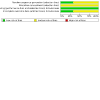
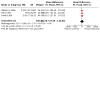
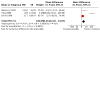
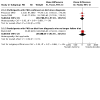
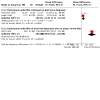

Update of
-
Tyrosine supplementation for phenylketonuria.Cochrane Database Syst Rev. 2013 Jun 5;2013(6):CD001507. doi: 10.1002/14651858.CD001507.pub3. Cochrane Database Syst Rev. 2013. Update in: Cochrane Database Syst Rev. 2021 Jan 4;1:CD001507. doi: 10.1002/14651858.CD001507.pub4. PMID: 23737086 Free PMC article. Updated.
Comment in
-
What are the effects of tyrosine supplementation for people with phenylketonuria? A Cochrane Review summary with commentary.Dev Med Child Neurol. 2022 Jul;64(7):815-817. doi: 10.1111/dmcn.15210. Epub 2022 Mar 18. Dev Med Child Neurol. 2022. PMID: 35304740 No abstract available.
References
References to studies included in this review
Mazzocco 1992 {published data only}
-
- Mazzocco MM, Yannicelli S, Nord AM, Van Doorninck W, Davidson-Mundt AJ, Greene CL. Cognition and tyrosine supplementation among school-aged children with phenylketonuria. American Journal of Diseases of Children 1992;146(11):1261-4. - PubMed
Pietz 1995 {published data only}
-
- Pietz J, Landwehr R, Kutscha A, Schmidt H, Sonneville L, Trefz FK. Effect of high-dose tyrosine supplementation on brain function in adults with phenylketonuria. Journal of Pediatrics 1995;127(6):936-43. - PubMed
References to studies excluded from this review
Kalkanoglu 2005 {published data only}
-
- Kalkanoglu HS, Ahring KK, Sertkaya D, Moller LB, Romstad A, Mikkelsen I, et al. Behavioural effects of phenylalanine-free amino acid tablet supplementation in intellectually disabled adults with untreated phenylketonuria. Acta Paediatrica 2005;94(9):1218-22. - PubMed
Lines 1997 {published data only}
-
- Lines D, Magarey A, Raymond J, Robertson E. Tyrosine supplementation in phenylketonuria [letter]. Journal of Paediatrics and Child Health 1997;33(2):177. - PubMed
Lou 1987 {published data only}
-
- Lou HC, Lykkelund C, Gerdes AM, Udesen H, Bruhn P. Increased vigilance and dopamine synthesis by large doses of tyrosine or phenylalanine restriction in phenylketonuria. Acta Paediatrica Scandinavica 1987;76(4):560-5. [CENTRAL: CN-00049883] [PMID: ] - PubMed
Lykkelund 1988 {published data only}
-
- Lykkelund C, Nielsen JB, Lou HC, Rasmussen V, Gerdes AM, Christensen E, et al. Increased neurotransmitter biosynthesis in phenylketonuria induced by phenylalanine restriction or by supplementation of unrestricted diet with large amounts of tyrosine. European Journal of Pediatrics 1988;148(3):238-45. - PubMed
MacDonald 2003 {published data only}
Wasser 1992 {published data only}
-
- Wasser S, Ettrich KU, Schmidt KD, Selle D, Theile H. Case studies of the effect of tyrosine administration in children with phenylketonuria on cognitive processes [Fallstudien zum einfluss von tyrosingaben bei phenylketonurischen kindern auf kognitive prozesse]. Klinische Padiatrie 1992;204(6):417-21. [CENTRAL: 187698] [EMBASE: 1992359029] - PubMed
Yano 2014 {published data only}
-
- Yano S, Moseley K, Azen C. Incorporating neurotransmitter metabolites melatonin and dopamine for optimizing dietary management of phenylketonuria: Tryptophan supplementation alone does not improve serotonin metabolism. Molecular Genetics and Metabolism (first received 2014);111(3):293-4. [CENTRAL: CN-01073797] [EMBASE: 71804971]
-
- Yano S, Moseley K, Azen C. Melatonin and dopamine as biomarkers to optimize treatment in phenylketonuria: effects of tryptophan and tyrosine supplementation. Journal of Inherited Metabolic Disease (first received 2014);37 Suppl 1(1):S60. [ABSTRACT NO.: P-061] [CENTRAL: CN-01059290] [EMBASE: 71585474] - PMC - PubMed
Additional references
Dixon 1994
-
- Dixon M. Disorders of amino acid metabolism, organic acidaemias and uria cycle defects. In: Shaw V, Lawson M, editors(s). Clinical Paediatric Dietetics. Oxford: Blackwell Science, 1994:177-209.
Elbourne 2002
-
- Elbourne DR, Altman DG, Higgins JPT, Curtin F, Worthington HV, Vail A. Meta-analysis involving cross-over trials: methodological issues. International Journal of Epidemiology 2002;31(1):140-9. - PubMed
Lou 1985
-
- Lou HC, Guttler F, Lykkelund C, Bruhn P, Niederwieser A. Decreased vigilance and neurotransmitter synthesis after discontinuation of dietary treatment for phenylketonuria in adolescents. European Journal of Pediatrics 1985;144(1):17-20. - PubMed
MRC1 1993
MRC2 1993
Oldendorf 1973
-
- Oldendorf WH. Saturation of blood brain barrier transport of amino acids in phenylketonuria. Archives of Neurology 1973;28(1):45-8. - PubMed
Paine 1957
-
- Paine RS. The variability and manifestations of untreated patients with phenylketonuria (phenylpyruvic aciduria). Pediatrics 1957;20:290-302. - PubMed
Schulz 1995
-
- Schulz KF, Chalmers I, Hayes RJ, Altman DG. Empirical evidence of bias. Dimensions of methodological quality associated with estimates of treatment effects in controlled trials. Journal of the American Medical Association 1995;273(5):408-12. - PubMed
Scriver 1995
-
- Scriver CR, Kaufman S, Woo SLC. The hyperphenylalaninaemias. In: Scriver CR, Beaudet AL, Sly WS, Valle D, editors(s). The Metabolic and Molecular Bases of Inherited Disease. 7th edition. New York: McGraw-Hill, 1995:1015-76.
References to other published versions of this review
Webster 2010
Publication types
MeSH terms
Substances
LinkOut - more resources
Full Text Sources
Other Literature Sources
Medical

